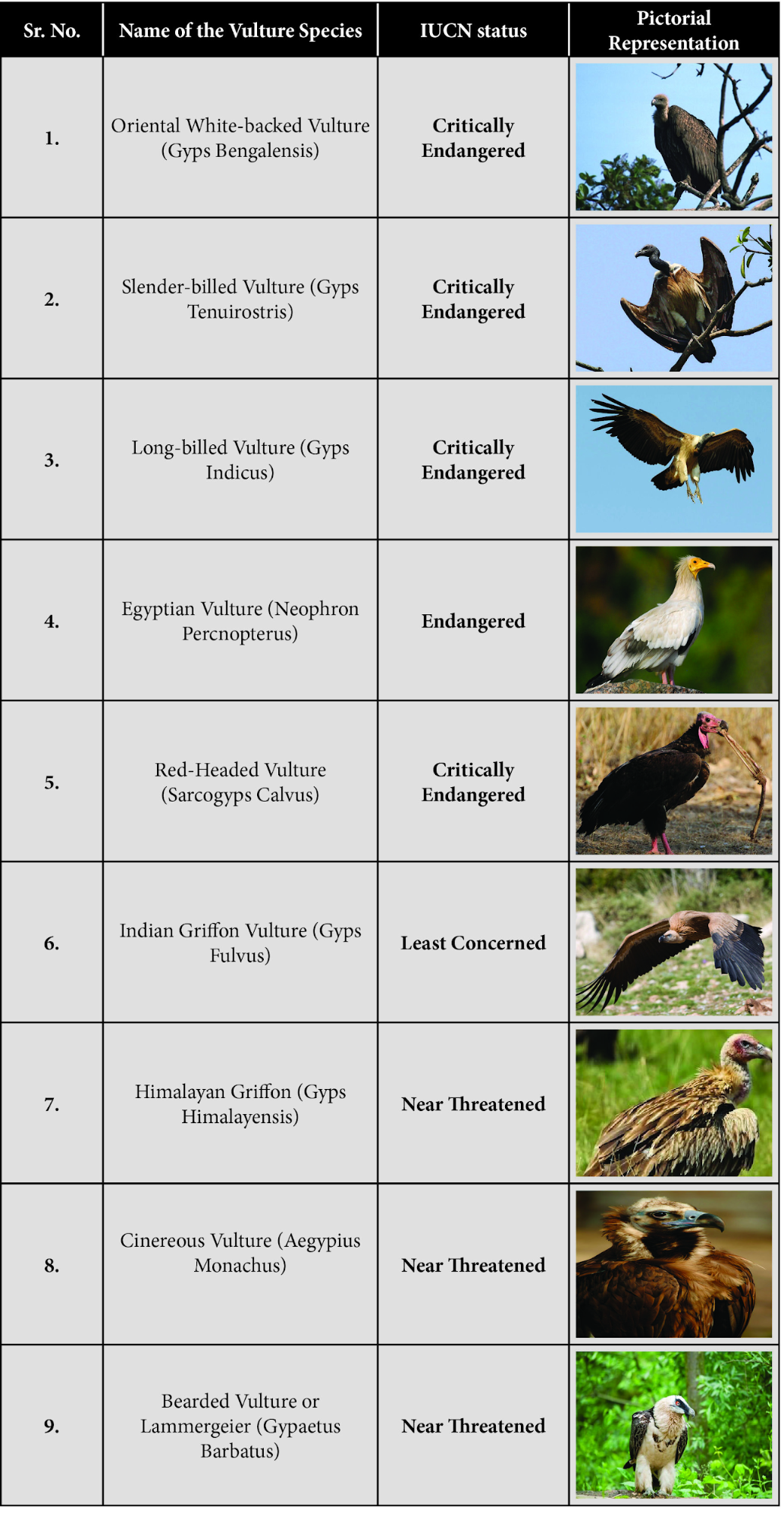Biodiversity & Environment
Vulture Action Plan
- 17 Nov 2020
- 6 min read
Why in News
Recently, the Ministry of Environment, Forests and Climate Change (MoEFCC) launched a Vulture Action Plan 2020-25 for the conservation of vultures in the country.
Key Points
- Background:
- Vulture numbers saw a decline as much as 90% in some species in India since the 1990s in one of the most drastic declines in bird populations in the world.
- Between the 1990s and 2007, numbers of three presently critically-endangered species, the Oriental white-backed, long-billed and slender-billed vultures decreased massively with 99% of the species having been wiped out.
- The number of red-headed vultures, also critically-endangered now, declined by 91% while the Egyptian vultures by 80%.
- The decline in vulture populations came into limelight in the mid-90s..
- Reason for decline:
- The cause of the decline was established as diclofenac, a veterinary nonsteroidal anti-inflammatory drug (NSAID) in 2004, which is used to treat pain and inflammatory diseases such as gout in carcasses that vultures would feed off.
- Just 0.4-0.7% of animal carcasses contaminated with diclofenac was sufficient to decimate 99% of vulture populations.
- The MoEFCC released the Action Plan for Vulture Conservation 2006 with the Drugs Controller General of India (DCGI) banning the veterinary use of diclofenac in the same year.
- Objectives of the Action Plan for Vulture Conservation 2020-2025.
- Drug control:
- To ensure minimum use of Diclofenac.
- To Prevent the poisoning of the principal food of vultures, the cattle carcasses, with veterinary NSAIDs, by ensuring that sale of veterinary NSAIDs is regulated and is disbursed only on prescription and by ensuring that treatment of livestock is done only by qualified veterinarians.
- To carry out safety testing of available NSAIDs on vultures and to develop new ones which do not affect vultures.
- To ensure that DGCI must institute a system that automatically removes a drug from veterinary use if it is found to be toxic to vultures.
- Such a system would ensure that drugs other than diclofenac that are toxic to vultures like aceclofenac and ketoprofen are banned for veterinary use.
- Upscaling conservation:
- To establish Additional Conservation Breeding Centres along with Vulture Conservation Centres with samples and information collected from the wild analysed and stored at these centres.
- To implement the Vulture Safe Zone programme at eight different places in the country where there are existing populations of vultures.
- To launch conservation plans for the Red-headed and Egyptian vultures, with breeding programmes for both.
- To declare a Vulture Safe Zone only when no toxic drugs are found in undercover pharmacy and cattle carcass surveys, for two consecutive years, and the vulture populations are stable and not declining.
- To build Four rescue centres for different geographical areas like Pinjore in the north, Bhopal in ventral India, Guwahati in Northeast and Hyderabad in South India.
- Drug control:
- Other Efforts:
- National:
- The Central Zoo Authority (CZA) and Bombay Natural History Society (BNHS) also established the Vulture Conservation Breeding Programme.
- A Vulture Care Centre (VCC) was set up at Pinjore, Haryana in 2001 to study the cause of deaths of vultures in India.
- The Jatayu Conservation Breeding Centre in Pinjore is the world’s largest facility within the state’s Bir Shikargah Wildlife Sanctuary for the breeding and conservation of Indian vulture species.
- International: SAVE (Saving Asia’s Vultures from Extinction)
- The consortium of like-minded, regional and international organizations, created to oversee and coordinate conservation, campaigning and fundraising activities to help the plight of south Asia’s vultures.
- Objective: To save three critically important species from extinction through a single programme.
- SAVE partners: Bombay Natural History Society, Bird Conservation Nepal, RSPB (UK), National Trust for Nature Conservation (Nepal), International Centre for Birds of Prey (UK) and Zoological Society of London.
- National:
Vultures in India
- India is home to nine species of vultures, but most of them face the danger of extinction.
- The nine species of vultures & their International Union for Conservation of Nature (IUCN) status are:
- Why vultures should be protected:
- The scavenging lifestyle that gives them a bad reputation is, in fact, that makes them so important for the environment, nature and society.
- Vultures feeding on dead animals help areas getting rid of carcasses that, otherwise, would provide foul smells and scenery for a much longer period hence also known as nature’s cleanup crew.
- Vultures also play a valuable role in keeping wildlife diseases in check.






-min.jpg)